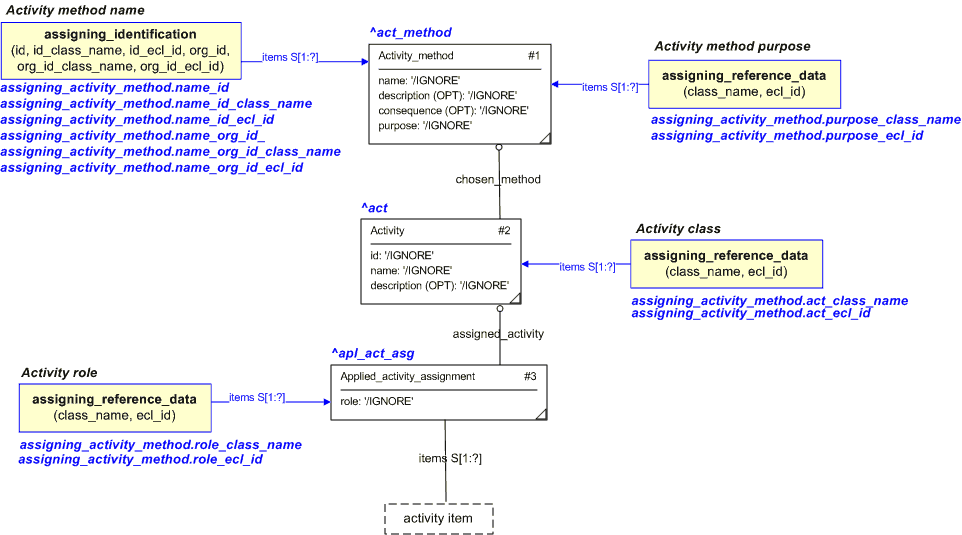Template:— assigning_activity_method (asg_act_meth)
Context:— NDLO |
Date: 2007/09/28 12:44:03
Revision: 1.2
|
This section specifies the template assigning_activity_method.
NOTE
The template has been defined in the context of
NDLO.
Refer to the business context for details of related templates.
NOTE
An explanation of a template and the associated instantiation path is
provided in the
Template overview
section.
This template describes applied_activity_assignment (classified), activity (classified) and activity_method (identified, classified)
in one template.
The EXPRESS-G diagram in
Figure
1
shows the templates and EXPRESS entities that are required
to represent the template
"assigning_activity_method".
The text highlighted in blue shows the template parameters.
...
Figure 1 — An EXPRESS-G representation of the Information model for assigning_activity_method
The graphic for the template to be used in other EXPRESS-G diagrams
is shown in Figure
2
below.
...
Figure 2 — The graphical representation of the assigning_activity_method template
The following input parameters are defined for this template:
The identifier of the activity method.
The name of the class being used to classify the identification
(
Identification_assignment)
of the activity method . This provides the role or reason for the identification.
The following classes and their sub-classes can be used:
The identifier of the
External_class_library
storing the definition of the class referenced by the parameter @id_class_name class.
The name or identifier of the organization owning the id of the typical activity.
The name of the class being used to classify the
identification of the organization. For example CAGE code, or organization name.
The following classes and their sub-classes can be used:
The name of the class being used to classify the purpose of the activity method.
The following classes and their sub-classes can be used:
classifications: [Revision_notice_implementation_method]![[warning:]](../../../../../../images/dex/warning.gif) Error RDL1: The class Revision_notice_implementation_method does not exist in RDL at urn urn:plcs:rdl:std. Check the dexlib/data/refdata/rdl_index.xml
Error RDL1: The class Revision_notice_implementation_method does not exist in RDL at urn urn:plcs:rdl:std. Check the dexlib/data/refdata/rdl_index.xml
The identifier of the
External_class_library
storing the definition of the class referenced by the parameter class.
The class name of the
External_class corresponding to the
role of the assignment, e.g.
[Implement_revision_notice_in_product]![[warning:]](../../../../../../images/dex/warning.gif) Error RDL1: The class Implement_revision_notice_in_product does not exist in RDL at URI urn:plcs:rdl:std. Check the dexlib/data/refdata/rdl_index.xml
Error RDL1: The class Implement_revision_notice_in_product does not exist in RDL at URI urn:plcs:rdl:std. Check the dexlib/data/refdata/rdl_index.xml
The following classes and their sub-classes can be used:
act_ecl_id (Default='urn:plcs:rdl:std',Type='URN')
The identifier of the
External_class_library storing the
definition of the class referenced by the parameter @act_class_name.
The class name of the
External_class corresponding to the
role of the assignment, e.g.
[Revision_notice_implementation]![[warning:]](../../../../../../images/dex/warning.gif) Error RDL1: The class Revision_notice_implementation does not exist in RDL at URI urn:plcs:rdl:std. Check the dexlib/data/refdata/rdl_index.xml
Error RDL1: The class Revision_notice_implementation does not exist in RDL at URI urn:plcs:rdl:std. Check the dexlib/data/refdata/rdl_index.xml
The following classes and their sub-classes can be used:
The identifier of the
External_class_library storing the
definition of the class referenced by the parameter @role_class_name.
The activity, product, individual, task_method, etc that is being assigned to
the activity.
The following reference parameters are defined for this template:
Allow the
Activity
entity instantiated in this path to be referenced when this template is used.
Note: The
Activity
entity can be referenced in a template path by:
%^target = $assigning_activity_method.act%
where
target
is the parameter to which the
Activity
is bound.
Allows referencing of entity Activity from outside the template.
Allow the
Activity_method
entity instantiated in this path to be referenced when this template is used.
%^target = $assigning_activity_method.act_method%
%^target = $assigning_activity_method.apl_act_asg%
The instantiation path shown below specifies the entities that are to be
instantiated by the template.
A description of templates and the syntax for the instantiation path is
provided in the
Templates Help/Information section.
-- instantiate Activity Activity%^act =
Activity%
^act.id = '/IGNORE'
^act.name = '/IGNORE'
^act.description = '/IGNORE'
-- assign reference data to activity /
assigning_reference_data(
class_name=@act_class_name,
ecl_id=@act_ecl_id,
items=^act)/
Activity_method%^act_method =
Activity_method%
^act_method.name = '/IGNORE'
^act_method.purpose = '/IGNORE'
^act_method.description = '/IGNORE'
^act_method.consequence = '/IGNORE'
/
assigning_identification(
id=@name_id,
id_class_name=@name_id_class_name,
id_ecl_id=@name_id_ecl_id,
org_id=@name_org_id,
org_id_class_name=@name_org_id_class_name,
org_id_ecl_id=@name_org_id_ecl_id,
items=^act_method)/
/
assigning_reference_data(
class_name=@purpose_class_name,
ecl_id=@purpose_ecl_id,
items=^act_method)/
-- Assign the Activity to the Activity method
^act.chosen_method ->
^act_method
-- Instantiate an Applied_activity_assignment Applied_activity_assignment%^apl_act_asg =
Applied_activity_assignment%
-- Set the Applied_activity_assignment attribute role to be ignored
^apl_act_asg.role = '/IGNORE'
-- Assign reference data for role of Applied_activity_assignment /
assigning_reference_data(
items=^apl_act_asg,
class_name=@role_class_name,
ecl_id=@role_ecl_id)/
-- Assign the Applied_activity_assignment to the -- to the instances passed into the template through the @items -- input parameter (e.g. a Product_as_realized)
^apl_act_asg.items ->
@items-- Assign the Applied_activity_assignment to the Activity_actual
^apl_act_asg.assigned_activity ->
^act
The following entities are instantiated with attributes as specified:
The instance diagram in Figure
3
shows an example of the EXPRESS entities and templates that are instantiated by the template:
/assigning_activity_method(items='#1', class_name='...', ecl_id='urn:plcs:rdl:std')/
(an illustration of the consolidated assigning_activity_method template is shown in
Figure
4 below.)
Figure 3 — Entities instantiated by assigning_activity_method template
The instance diagram in
Figure
4
shows the graphic symbol for the template that is to be
used in other instance diagrams. The example template is:
/assigning_activity_method(items='#1', class_name='...', ecl_id='urn:plcs:rdl:std')/
Figure 4 — Instantiation of assigning_activity_method template
Characterizations
No common characterizations of the template
assigning_activity_method
have been identified. However, the ISO 10303-239 EXPRESS model
may enable other assignments to the entities instantiated by the template.




